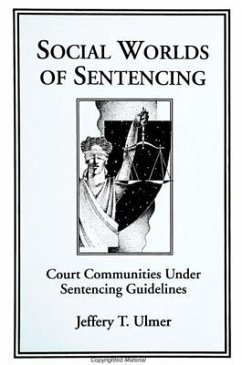Many states and the federal system have embraced sentencing guidelines as a mechanism of sentencing reform. This book draws from interactionist theories of organizations and James Eisenstein's depiction of courts as communities to frame an investigation of sentencing disparity, case processing, and organizational relations under Pennsylvania's sentencing guidelines. The author provides a statistical analysis of statewide sentencing outcomes and a comparative statistical and ethnographic analysis of three different-sized county courts. The statistical data show that the major influences on sentencing are legally prescribed ones, but that factors such as conviction by trial, race and gender, and court size are also significant. Ethnographic data illuminate processes behind the statistics by connecting court organizational contexts to case processing strategies, and these strategies to sentencing outcomes. The book concludes with twelve general propositions for future research, discussing possibilities and limitations of sentencing guidelines, and addressing broader issues in the sociology of crime, law, and organizations.








